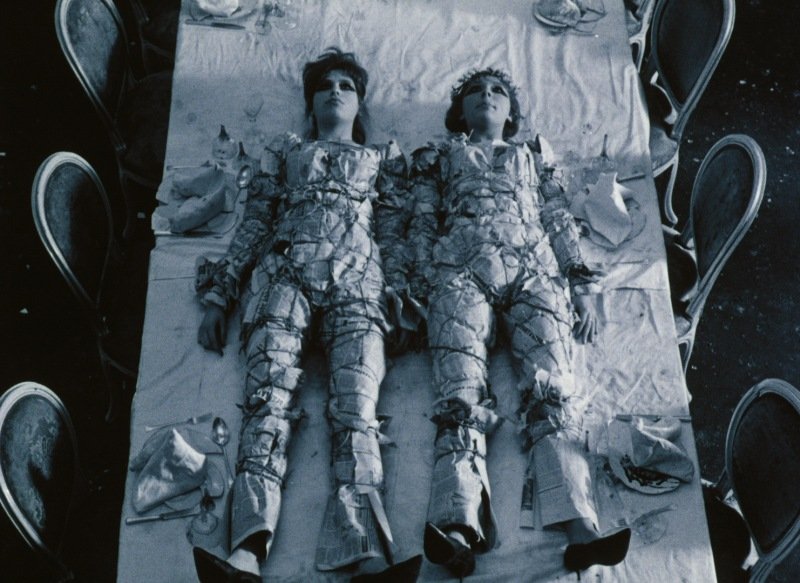Věra Chytilová’s second feature film is one of the most celebrated films of the 1960s Czechoslovak New Wave. Shot when Chytilová was 37 years old, this timeless and vibrant classic continues to inspire new generations of viewers. A provocative film, it tells the story of two young women who decide to mirror the decadent, hedonistic world in which they live. Marie I and Marie II have no qualms with traditional morality or social norms, carelessly bamboozling the men attracted to their carefree exuberance – mostly older men. Although it was lauded by critics across the globe, and hailed at a multitude of film festivals, the film was subject to censorship in Czechoslovakia, having the rare “privilege” of being one of the few films to be heavily criticized by the country’s parliament.
Daisies
Sedmikrásky

|
No physical screenings scheduled. |
- Direction: Věra Chytilová
- Script: Ester Krumbachová, Věra Chytilová
- Cinematography: Jaroslav Kučera
- Editing: Miroslav Hájek
- Sound: Ladislav Hausdorf
- Music: Jiří Šust, Jiří Šlitr
- Actors: Jitka Cerhová, Ivana Karbanová, Julius Albert, Jan Klusák, Marie Češková, Jiřina Myšková
- Production: Filmové Studio Barrandov
- Sets: Karel Lier
- Format: DCP
- Color: B&W / Color
- Production Country: Czechoslovakia
- Production Year: 1966
- Duration: 73'
- Contact: Czech National Film Archive
- Awards/Distinctions: Grand Prix de l'UCC 1969
Věra Chytilová
Věra Chytilová (1929-2014), one of the brightest of the new wave of directors who emerged in Czechoslovakia in the mid-60s, is considered to be among the most significant creative figures in Czech cinematography. She studied philosophy and architecture, then worked as a technical draftsman, a designer, a fashion model, a photo re-toucher, and as a clapper girl for Barrandov Film Studios in Prague. There she continued as a writer, actress, and assistant director. She was denied a scholarship from Barrandov to study film production, but in 1957 she took the admissions tests at FAMU and was accepted. While there, she directed several shorts and completed her graduation effort, The Ceiling (1961). Her acclaimed 1966 farce Daisies dealt with hedonism among young people of Prague and was banned by the Czech government. Unlike several of her contemporaries, Chytilová did not move to the West after the suppression of the Prague Spring in 1968. Her feature films combine the elements of cinema vérité and formalism, often spiked with elements of anarchic, surreal humor. In the majority of her films, she addresses the fate of women and their experiences in modern times. Praised as “Czech New Wave’s most rebellious, irreverent and boundary-breaking talent”, she left a legacy of films acclaimed for visual experimentation and for bold unmasking of the moral problems of contemporary society.
Filmography
1961 The Ceiling | Strop (short)
1962 A Bagful of Fleas | Pytel blech (short)
1963 Something Different | O něčem jiném
1966 Daisies | Sedmikrásky
1970 Fruit of Paradise | Ovoce stromů rajských jíme
1976 The Apple Game | Hra o jablko
1979 Prefab Story | Panelstory aneb Jak se rodí sídliste
1980 Calamity | Kalamita
1983 The Very Late Afternoon of the Faun | Faunovo velmi pozdní odpoledne
1984 Prague: The Restless Heart of Europe | Praha - neklidné srdce Evropy (doc)
1986 Wolf's Hole | Vlčí bouda
1987 The Jester and the Queen | Šašek a královna
1988 Tainted Horseplay | Kopytem sem, kopytem tam
1991 My Citizens of Prague Understand Me | Mí Prazané mi rozumeji
1992 The Inheritance or Fuckoffguysgoodday | Dědictví aneb Kurvahošigutntag
1998 Traps | Pasti, pasti, pasticky
2001 Ban from Paradise | Vyhnání z ráje
2005 In Search of Ester | Patrani po Ester (doc)
2006 Pleasant Moments | Hezké chvilky bez záruky














